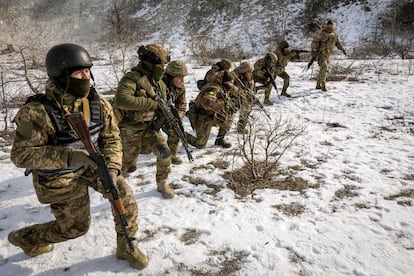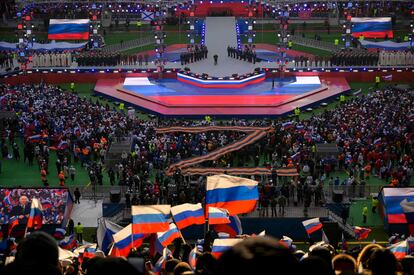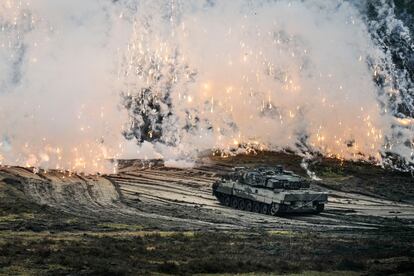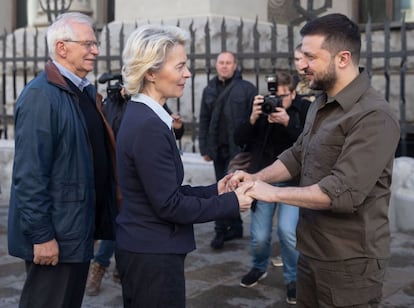As the war in Ukraine enters its second year, what now for Kyiv and Moscow?
As both sides prepare for battlefield offensives, NATO is seeking to provide security guarantees while Moscow strengthens its alliances to gain military and diplomatic traction


A few days before Vladimir Putin ordered a full-scale invasion of Ukraine on February 24, 2022, several of Kyiv’s Western allies warned the government of Volodymyr Zelenskiy that their intelligence services were predicting not only an assault by Russian forces on the country’s eastern borders, but the seizure of the capital and the collapse of the administration. Many Russian tank commanders were wearing dress uniforms on the day of the invasion. The Kremlin was approaching its “special military operation” as a parade. The strategic objective was to capture Kyiv within three days, a highly symbolic prize for Putin’s illusory imperialist discourse. Now, as Russia’s war in Ukraine enters its second year, huge question marks over short- and medium-term developments on the battlefield and the outcome of the war remain.
In Kyiv, domestic politics will be focused on the war and its European perspectives. In Moscow, where Putin and his security apparatus maintain the support of a citizenry fed a menu of furiously anti-Western propaganda and who are increasingly accustomed to the routine of conflict, little change is expected.
Putin’s war has become a vicious battle of attrition in which Ukraine is increasingly more reliant on its Western allies to remain afloat, as much in terms of day-to-day financing and reconstruction plans as on the front lines. Russia, increasingly isolated on the international markets by sanctions and having received several battlefield blows, remains standing having turned its economy into a fiscal fortress. More sanctions are likely, although the sphere for imposing them is narrowing and negotiations are increasingly difficult.

Moscow is now looking outward, both to strengthen alliances with its partners and to seek new ties to increase its combat capability. Many observers are closely watching China. US intelligence has warned that Beijing could supply Moscow with drones, artillery and other military hardware. Additionally, the UK Ministry of Defense has reported the Kremlin is likely to seek further supplies of Iranian attack drones. At the same time, Putin is spreading his tentacles in search of diplomatic traction to circumvent Western sanctions.
According to a Western intelligence agency source, Moscow has intensified its disinformation campaign in the so-called global south on issues such as the food crisis. Meanwhile, the Kremlin’s agents of influence will seek to revive rhetoric about the impact of war and sanctions. “We will see more and more speeches encouraging Ukraine to throw in the towel,” the same source notes. Some analysts predict that the Western allies – who have so far maintained a united discourse that Ukraine and Ukraine alone should decide the goals of the conflict and determine when or if it is ready to negotiate its end – will increase dialogue with Kyiv to try to design common strategic goals and, above all, a diplomatic resolution to the war. As things stand, there is little appetite for the negotiating table in Kyiv or Moscow. The crimes against humanity that Russia is accused of committing in Ukraine and Putin’s nuclear rhetoric present significant obstacles to any path toward talks.
Putin, far from reining in his territorial threats, has again hinted that his next goal after illegally annexing four partially controlled Ukrainian regions will be the “historical territories of Russia now called Ukraine.”
For Kyiv, the only option on the table is to continue fighting, says Orysia Lutsevich, head of the Ukrainian forum at the Royal Institute of International Affairs in London. Moscow remains confident of victory and that in the marathon Putin has converted the war into, Ukraine and its allies will be the first to run out of breath. The West’s support for Kyiv has been unwavering since the beginning of the war, not only through unprecedented sanctions but, in the case of the EU for example, by also breaking one of the bloc’s biggest historical taboos: providing military support. However, with no end in sight on the battlefield, Brussels and Washington are seeking urgent ways to keep Ukraine supplied with ammunition through new financial mechanisms and agreements with the defense industry.
There are also concerns about the sustainability of arms production. The most precious resource – ammunition – could arrive too late at the front lines. Kyiv’s needs on the ground are pressing. Russia has tentatively launched its new offensive – which at the moment is not tactically well-designed, according to the head of Ukrainian military intelligence, Kyrylo Budanov – and Ukraine’s forces are preparing their own push on the southern front, where the objective is to sever the corridor Russia has created by occupying territory between the Crimean Peninsula (illegally annexed by Moscow in 2014) and the Donbas region. Many analysts view the upcoming counter-offensive as a decisive moment in gauging Western commitment to Ukraine: especially if it fails or progresses more sluggishly than expected.

Kyiv and Moscow are monitoring the economic situation in the West very closely. Both are well aware that a severe recession could carry a political cost for the governments that have supported Ukraine and cause a shift in public opinion. Important political events that could prove decisive for the future of the Kremlin’s war are marked in red on the calendars of both governments. Above all, the 2024 US presidential elections and the Democratic and Republican campaigns for the White House, in which the war will play a major role. President Joe Biden has provided substantial and vital support for Zelenskiy’s government, but the question remains as to what would happen under a hypothetical Republican administration.
Kyiv, meanwhile, has embarked on reforms to its judicial system, toughened anti-corruption measures and enacted laws to limit the political power of the oligarchs and ensure the rights of minorities with a view to opening accession negotiations with the European Union before the end of the year. In another context the objective of Zelenskiy’s administration would be impossible, but only three months passed between Kyiv lodging its membership application and the EU declaring Ukraine a candidate country. Brussels, in fact, is trying to construct a tailor-made mechanism for Kyiv to achieve de facto membership. The European Commission will deliver a progress report to member states in the spring on the progress of reforms and the seven-point plan Kyiv has been handed to meet membership requirements. “There is clear political will at the top of the EU and recognition of the symbolism that Ukraine is defending the European way of life,” says Lutsevich.
With the war still raging and the allies engaged in negotiations over new arms shipments – heavy tanks, long-range weapons and, in a major step the West has proved unwilling so far to sanction, fighter aircraft – NATO is exploring what kind of post-war security guarantees it can offer Kyiv as a long-range perspective. Ukraine received an invitation to join the Atlantic Alliance in 2008 but since then, and despite Moscow’s rhetoric, it has not moved an inch in that direction. NATO is now seeking ways to offer some kind of protection to Ukraine similar to that laid out in Article 5 of the treaty, by which member states would commit to defend Kyiv if it were attacked again, according to allied sources. This plan, however, has not met with the approval of the Baltic states and Poland, who are calling instead for Ukraine’s rapid admission into the alliance.

Meanwhile, the prognosis on the battlefield remains uncertain, says historian Andriy Zayarnyuk of the University of Winnipeg. “The main lesson of wars is that one cannot control them. You can’t maintain a military conflict at a low level and enjoy the illusion of control.” Russia is continuing its attacks on civilian and energy infrastructure, and Ukrainian authorities have warned that Moscow is preparing new large-scale air strikes. In Donbas, the war has become entrenched. Artillery battles are raging and huge areas of the undulating mining region – already badly bruised by eight years of conflict between Kyiv and pro-Russian separatists, behind which the Kremlin sheltered its own forces and its political and economic support – are falling into ruins.
On the ground, both armies are suffering heavy casualties. Russia, which has deployed only half of its mobilized military, could launch another recruitment campaign in the coming months, notes Russian analyst Tatyana Stanovaya, a researcher at the Carnegie Endowment for International Peace and founder of the analytical network R. Politik. In some regions of Ukraine - where in the early months of the war tens of thousands of recruits from all over the country enlisted and who remain on reservist lists - call-ups are being handed out to those of military service age who did not initially sign up.
While Kyiv pushes through its agenda of reforms with an eye on the European perspective, there is little scope of domestic policy changes in Russia, Stanovaya notes. This will remain the case even if in the run-up to the March 2024 presidential elections – for which the country is still awaiting clarification on whether Putin will run again, although he has already secured changes the Constitution to enable him to do so – there are some movements within the government or other announcements. “The country has entered a kind of atmosphere of routine; people are getting used to the invasion. They are preparing for a long war. They admit that it may last two, three years,” Stanovaya says. “Unless something extraordinary happens, this year we will witness a year similar to the last.”
What is certain is that the outcome of the most globalized war since World War II will decide not only the future of Ukraine, notes Serhii Plokhy, one of the country’s most distinguished historians: it will also have a major impact on the future of the post-Soviet sphere and on the ability of countries such as Moldova, Georgia and Kazakhstan to conduct fully independent foreign policies. “Russia’s victory would create a new threat to Europe, its values, institutions and way of life; it would also consolidate Moscow’s ruling regime. Ukraine’s victory would give the Russian opposition the opportunity to emerge as a strong political force and ultimately change the militaristic course, which is devastating not only for Russia’s neighbors, but also for Russia itself,” says Plokhy, director of the Ukrainian Research Institute at Harvard University.
The results of the war are already obvious, adds the professor: Russia has suffered a strategic defeat. Ukraine has survived and Kyiv will maintain its independence and continue on its path toward European integration: “It is too early to say when this war will end. A lot depends on the results of the current Russian offensive and the planned Ukrainian counter-offensive. The more Western solidarity and assistance Ukraine receives, the sooner the war will end, the less suffering there will be in Ukraine and the more beneficial its outcome will be.”
Sign up for our weekly newsletter to get more English-language news coverage from EL PAÍS USA Edition
Tu suscripción se está usando en otro dispositivo
¿Quieres añadir otro usuario a tu suscripción?
Si continúas leyendo en este dispositivo, no se podrá leer en el otro.
FlechaTu suscripción se está usando en otro dispositivo y solo puedes acceder a EL PAÍS desde un dispositivo a la vez.
Si quieres compartir tu cuenta, cambia tu suscripción a la modalidad Premium, así podrás añadir otro usuario. Cada uno accederá con su propia cuenta de email, lo que os permitirá personalizar vuestra experiencia en EL PAÍS.
¿Tienes una suscripción de empresa? Accede aquí para contratar más cuentas.
En el caso de no saber quién está usando tu cuenta, te recomendamos cambiar tu contraseña aquí.
Si decides continuar compartiendo tu cuenta, este mensaje se mostrará en tu dispositivo y en el de la otra persona que está usando tu cuenta de forma indefinida, afectando a tu experiencia de lectura. Puedes consultar aquí los términos y condiciones de la suscripción digital.








































